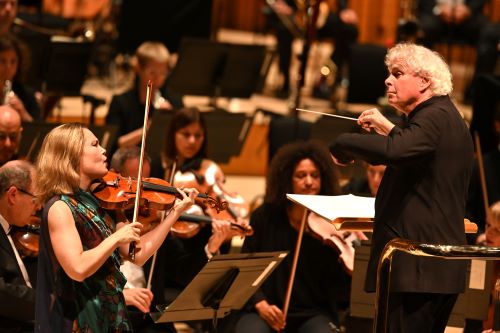 United Kingdom Emily Howard, Colin Matthews, Walton: Leila Josefowicz (violin), London Symphony Orchestra / Sir Simon Rattle (conductor), 14.9.2019. (CC)
United Kingdom Emily Howard, Colin Matthews, Walton: Leila Josefowicz (violin), London Symphony Orchestra / Sir Simon Rattle (conductor), 14.9.2019. (CC)

(c) Mark Allan
Emily Howard – Antisphere (world premiere)
Colin Matthews -Violin Concerto (2009)
Walton – Symphony No.1 in B flat minor
Daunting programming – there is certainly demanding music here that rewards the listener’s efforts – is something of a Simon Rattle speciality. And, while the Walton might enjoy a certain level of familiarity (although it really does not seem to get out enough for its stature), both the Howard and the Matthews asked much of us.
It was nice to start the LSO’s season with a world premiere, here Emily Howard’s 2019 piece Antisphere, its title derived from non-Euclidian geometry in which instead of curving around its centre (like a sphere), the surface of an antisphere curves away. The artist Escher used the idea in some of his so-called ‘impossible’ works of art. Part of the idea is that in this ‘negative curvature’ everything shrinks, so Howard shrinks some common constructs – a cycle of fifths becomes coloured – squashed – by quarter-tones, beautifully realised by the LSO here. Howard is not afraid to move between crushing dissonance and more tonal constructs – referends rather than directionally functioning, arrived at via voice-leading as opposed to harmonic directionality. A clarinet solo over quasi-tonal strings was a particularly beautiful moment; passages of repeated fragments were, with the LSO, like a ride in a well-oiled machine. Perhaps the key to the piece is that word ‘moments’, though – a succession of gestures, some might say (with some justification) clichés. Whatever the mathematically inspired basis, there was the distinct impression of the generating idea outshining the music itself. The piece completes a triptych: Torus (Concerto for Orchestra: performed at the 2016 BBC Proms) and sphere.
Whatever the sonic, orchestrational achievements of the Howard, Colin Matthews’s Violin Concerto occupies a higher echelon of inspiration. It has in Leila Josefowicz perhaps the ideal interpreter (she introduced the work to the world in Birmingham in 2009, conducted by Knussen). It was a concerto that started, on this occasion, sadly in mid-ringtone; a particular shame given Josefowicz’s phrasing of the long, soulful (post-Britten?) melody. Scored for a smaller orchestra than the Howard, Matthews utilises his forces with impeccable mastery. That shadow of Britten remains in a shared sense of the enigmatic, dispelled here by the feisty, perilously difficult Scherzando. And whilst Matthews’s dissonances do not go to the extremes of Howard, they seem to make deeper incisions in the psyche. Josefowicz absolutely lived Matthews’s concerto, a true virtuoso yet perfectly attuned to Matthews’s world. No wonder the composer looked so thrilled at the close when he took his bows.
Post-interval, we heard Walton’s superb First Symphony. There is a distinguished recorded history here between the LSO and this work – Sir Colin Davis (2008, Barbican), yes, but maybe trumped on this occasion by the classic mid-1960s Previn? Rattle was absolutely up there with these distinguished predecessors. And by placing it in the context of the first half, I wonder if I was the only one that listened to it differently, now more aware of, for example, additive process? Rattle’s first movement was the most colourful journey through a territory that encompassed glorious brass, plaintive bassoon and simply beautiful oboe and solo cello in duet. It felt, in Rattle and the LSO’s capable hands, like a newly restored painting.
A flickering, nightmarish Scherzo played with that level of accuracy reserved for the LSO – a space hyper-alive under Rattle’s watchful eye – led to a moonlight-clear Andante con malinconia that included a gorgeous viola solo (Jane Atkins). Majesty – foreshadowings of Crown Imperial, to follow on just a few years later – characterised the finale; a risoluto fugue, its most complex overlappings supremely clear, led to a perfectly timed end.
It all bodes well for the forthcoming season; this concert overlapped with the very close of the BBC Proms (the Last Night, if we’re going to get technical about it), and its flag-waving jamboree. It has been a memorable summer over at the Proms, but the LSO seemed to be saying out with the old, in with the new.
Colin Clarke
For more about the LSO click here.